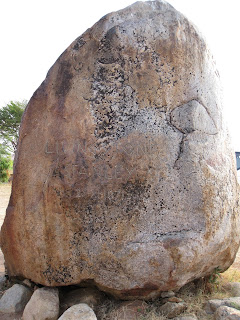France Screws Up...Again
France has refused to allow the extradition of Agathe Habyarimana to Rwanda. It has been sheltering her since three days after the genocide began in 1994. The original article is below.
This sort of news really frustrates me, especially in a time when Franco-Rwandan relations appear to be improving, and when there is a real opportunity for justice to be served. France can be astonishingly myopic when it comes to decisions like this. What do they gain from sheltering a war criminal of the magnitude of Rwandan former First Lady Agathe Habyarimana, the architect of the interahamwe, and one of the most extreme of the génocidaires?
What it’s really about is saving face—French President Mitterrand was famously close to Juvénal Habyarimana, the Hutu president whose plane was shot down in April 1994, and husband to Agathe.
If France is hesitant to “do the right thing” and voluntarily allow the extradition of Agathe to Rwanda, perhaps they would respond differently if the International Criminal Court (ICC) weighed in with an indictment. After all, the International Criminal Tribunal for Rwanda is not likely to act—it has been notoriously sluggish in its efforts to indict and try Tier 1 génocidaires. ICC Prosecutor José Maria Ocampo is on a roll with indictments of President Bashir, Col. Qadhafi, Kenyan leaders (for pre-election violence), Joseph Kony, and others. It seems to me that Agathe, whose interahamwe youth militia arguably inspired Bashir to facilitate the formation of the Janjaweed in Darfur, belongs in the same notorious category.
***
France Will Not Extradite Former Rwandan Leader's Widow
CNN Wire Staff
updated 3:11 PM EST, Thu September 29, 2011
Paris (CNN) -- A French appeals court on Wednesday rejected a Rwandan request to extradite the widow of former Rwandan President Juvenal Habyarimana, whose assassination sparked the 1994 genocide.
Lawyer Philippe Meilhac said his client, former first lady Agathe Habyarimana, was "relieved" and "very satisfied" with the court's decision.
"This is a very delicate case, as it can also impact relations between France and Rwanda, so this decision is important and in many ways symbolic," Meilhac said.
Habyarimana still faces a civil suit dating from 2007, when a French Rwandan rights collective accused her of being involved in the genocide, Meilhac said. Habyarimana has asked to be heard by a judge but is still waiting to be summoned, he said.
She faces a Rwandan warrant on genocide charges that include crimes against humanity, specifically murder and extermination; creation of a criminal gang, namely the Hutu militias; and aiding and abetting the killings perpetrated by soldiers in violation of the Geneva Conventions, John Bosco Mutangana, the head of Rwanda's Genocide Fugitives Tracking Unit, said last year.
Habyarimana left Rwanda for France soon after the violence broke out. Meilhac said there have been roughly 10 extradition requests during her 15 years in France.
Her husband, the former president, was killed in April 1994 when his plane was shot down near the capital, Kigali. The mass killings began hours later, and by the time they ended 100 days later, 800,000 people had been killed.
Most were members of the country's Tutsi minority, killed by members of the Hutu majority.
The circumstances surrounding the former president's death remain a mystery. He was a Hutu, and speculation immediately fell on Tutsis -- but some have also speculated that Hutus themselves may have shot down the plane to provide cover for the ensuing genocide.
Top officials such as army generals and politicians who allegedly took part in the genocide have been tried in the Rwandan justice system and the International Criminal Tribunal, which is based in Tanzania.
Civilians who allegedly contributed either directly or indirectly are tried by local communities in "gacaca" courts, which allow survivors to confront their attackers. Some human rights organizations have criticized the gacaca courts for falling short on delivering justice.
Habyarimana has no residency permit, having been refused legal status by the French prefecture. She has appealed that decision and is awaiting a ruling from the Versailles administration court in the next few weeks, Meilhac said.
"The administration court should look to the appeals court as an example," he said. "The case against my client is empty, and she deserves to be granted a residency permit."
http://www.cnn.com/2011/09/28/world/europe/rwanda-widow-extradition/?iref=obnetwork





